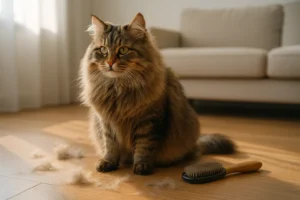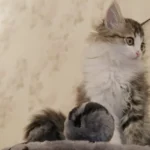
Siberian Cat Kitten Care Guide: Everything New Owners Should Know
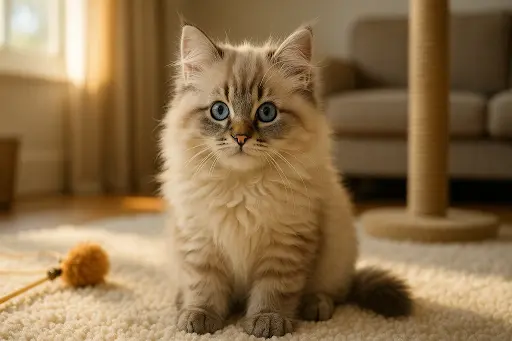
Welcoming a Siberian Cat Kitten into your home is both exciting and rewarding. Known for their fluffy coats, playful personalities, and affectionate nature, Siberian kittens make excellent companions for families and individuals alike. But caring for this unique breed requires more than just love and attention—it involves understanding their specific needs in grooming, nutrition, training, and health. If you are a new owner, this guide will give you everything you need to know to raise a happy, healthy, and well-adjusted Siberian Cat Kitten from the very beginning.
Key Highlights
- Siberian Cat Kittens are affectionate, playful, and intelligent, making them great family pets.
- They need a protein-rich diet to support growth and strong development.
- Grooming is essential, even at a young age, to manage their thick coats.
- Early socialization and gentle training are crucial for their temperament.
- Regular vet visits help monitor growth and prevent health issues.
Understanding the Siberian Cat Kitten Personality
The Siberian Cat Kitten is known for its friendly and curious nature. Unlike some breeds that may be shy or aloof, Siberians tend to bond quickly with their families. They are playful, energetic, and surprisingly adaptable, which makes them well-suited for households with children and even other pets.
Siberian kittens also inherit traits from their ancestry as a Siberian forest cat kitten, which gives them both resilience and agility. You’ll often find them climbing, exploring, or chasing toys around the house. Their strong sense of loyalty means they will want to be near you, often following family members from room to room. For even deeper insight into their temperament and quirks, many owners love exploring detailed Siberian cats facts before bringing one home.
Nutrition for Growing Siberian Kittens
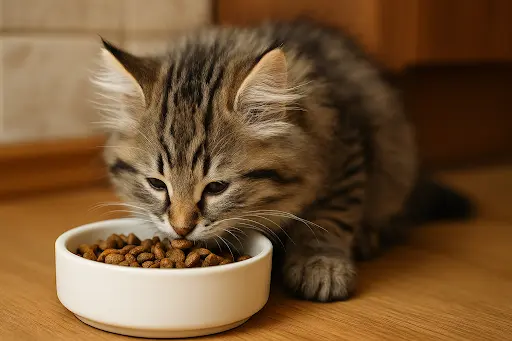
Feeding your Siberian Cat Kitten the right food is critical for healthy growth. At this stage, their bodies are developing rapidly, and they need a nutrient-dense diet with:
- High protein levels (from chicken, turkey, or fish)
- Healthy fats for energy and coat development
- Calcium and phosphorus to support bone and muscle growth
Most breeders and veterinarians recommend high-quality kitten food designed for large breeds, as it supports their longer growth phase. Avoid giving them too many treats or table scraps, since this can lead to digestive issues. Fresh water should always be available, and mealtime should be consistent to build healthy habits.
Grooming Needs
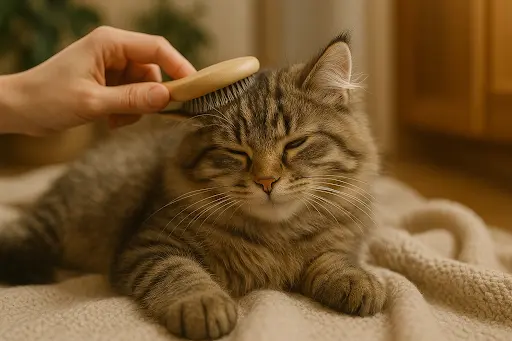
The thick triple coat of a Siberian Cat Kitten may look intimidating, but grooming them from a young age helps prevent mats and tangles later in life. Start with:
- Brushing 2–3 times per week to remove loose fur
- Introducing grooming tools early so your kitten becomes comfortable with the process
- Checking for knots around the neck and belly where tangling often occurs
Bathing isn’t necessary unless they get into something messy, but regular grooming sessions also help you bond with your kitten. As they grow, these sessions become a natural part of their care routine. It’s also worth noting that while Siberians don’t shed as heavily as some long-haired breeds, owners should still learn about Siberian cat shed patterns to manage their coats effectively.
Training and Socialization
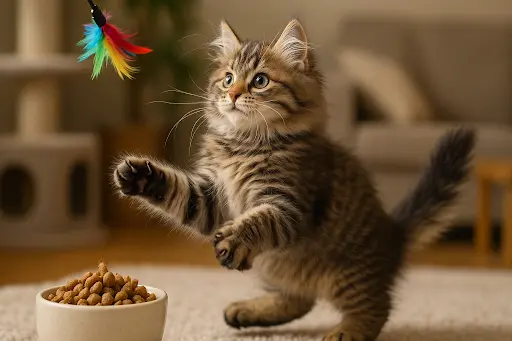
Siberians are intelligent and respond well to positive reinforcement. Training your Siberian Cat Kitten should start as soon as they arrive home. Some tips include:
- Litter training: Most kittens learn quickly, but consistency and a clean litter box are key.
- Basic commands: Teaching simple cues like “come” or “no” can help guide behavior.
- Interactive play: Using feather toys or puzzle games stimulates their minds and strengthens your bond.
Early socialization is also crucial. Introduce them gradually to new environments, people, and pets. This reduces anxiety and helps them grow into confident adults.
Health and Vet Care
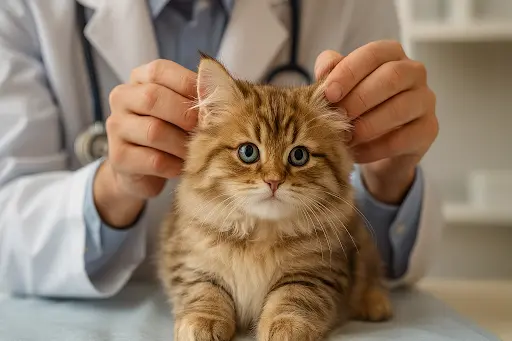
Taking care of your Siberian Cat Kitten means prioritizing regular vet visits. During their first year, they’ll need vaccinations, deworming, and spaying or neutering if not already done. Common health considerations include:
- Heart health: Siberians can be predisposed to hypertrophic cardiomyopathy, so routine checkups matter.
- Weight management: Because they are a large breed, it’s important to keep them active and prevent obesity.
- Dental care: Begin introducing dental hygiene early with kitten-safe chews or brushing techniques.
By keeping up with preventive care, you’ll help ensure your kitten enjoys a long, healthy life.
Cost Considerations: Siberian Cat Kitten Price
Before bringing one home, many new owners ask about the Siberian Cat Kitten price. Costs can vary depending on breeder reputation, location, and whether the kitten comes with pedigree papers. Typically, prices range from $1,200 to $3,000 in reputable breeding programs.
While this might seem high, the cost reflects the quality of care, genetic screening, and health guarantees provided by responsible breeders. Keep in mind, ongoing expenses like food, vet care, toys, and grooming supplies also add up.
Creating the Perfect Home Environment
To ensure your Siberian Cat Kitten thrives, make your home welcoming and safe. Provide scratching posts, climbing trees, and interactive toys to keep them entertained. A quiet corner with a soft bed helps them retreat when they need rest.
Siberian kittens love being part of family activities, so involve them in daily routines. They’ll repay you with loyalty, affection, and companionship.
Final Thoughts
Raising a Siberian Cat Kitten is a joyful and fulfilling experience. With the right care, attention, and love, your kitten will grow into a strong, affectionate, and loyal companion. From grooming to nutrition, training to vet care, understanding their unique needs from the start sets the foundation for a happy life together.
Whether you are drawn to their striking beauty, playful nature, or loving personality, your Siberian Cat Kitten will quickly become an inseparable part of your family.
FAQs
They are often considered more suitable for allergy sufferers due to lower Fel d 1 protein levels, but no cat is completely hypoallergenic.
Adult Siberians are large cats, often reaching 15–20 pounds, with males typically larger than females.
High-protein kitten food designed for large breeds is best, with fresh water always available.
Yes, their thick coats require brushing a few times per week to prevent matting.
They are very playful and energetic, needing plenty of toys, climbing spaces, and interactive playtime.
Expect to pay between $1,200 and $3,000 depending on breeder reputation and pedigree.
Yes, they are gentle, patient, and affectionate, making them excellent companions for families with kids.
Siberian Cat Info – Your trusted source for expert tips, breed facts, and care guides on Siberian cats.









